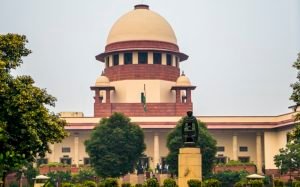The judgment concerns appeals against the acquittal of respondents in two separate criminal cases. The core issue revolves around the admissibility and reliability of confessional statements made to police officers under the now-repealed Terrorist and Disruptive Activities (Prevention) Act, 1987 (TADA Act), and the adherence to its associated rules and established judicial guidelines. The court scrutinises whether these confessions, crucial to the prosecution’s case, were voluntarily made and recorded with strict procedural compliance, particularly in light of their exceptional nature compared to general evidence law.
Terrorist and Disruptive Activities (Prevention) Act, 1987, Sections 3, 4, 15 – Terrorist and Disruptive Activities (Prevention) Rules, Rule 15 – Ranbir Penal Code, 1932, Sections 118, 302, 368 and 365 – Arms Act, 1959, Sections 3/25 – TADA – Appeal against acquittal – Appreciation of evidence – Confessional statement – Admissibility in evidence – Evidentiary value – Held that sum and substance of Section 15 of the TADA Act is that a confessional statement made voluntarily by a person before a police officer not below the rank of SP shall be admissible in the trial of such person for an offence under the TADA Act – Rule 15 deals with the procedural aspect regarding recording of confession made to police officers under Section 15 – Respondent No. 1 was lodged in a BSF camp at Srinagar where his confession was recorded – But there is no mention where the confession was recorded – Further, the time when the confession was recorded was not mentioned – PW-12 also did not mention whether he had afforded any time to respondent No. 1 to reflect before making the confession which is most crucial – This statement is as vague as it can be – Thus, there is clear departure from the norms which renders the confession highly suspect – The record does not contain any statement in the form of questions and answers wherefrom it could be deciphered that PW-12 had reason to believe that respondent No. 1 was making the confession voluntarily – Further, in his evidence PW-12 stated that he was posted as SP, CBI in New Delhi – He was on a visit to Srinagar on 06.08.1990 when respondent No. 1 was produced before him – Confessional statement of respondent No. 1 was recorded on the same day i.e. on 06.08.1990 at the BSF camp – It is thus apparent that since the confession was recorded on the same day, hardly any or no time for reflection was given which has vitiated the said confessional statement – The certificate appended to the confessional statement is dated 16.09.1990 whereas PW-12 in his evidence stated that he had recorded the confession of respondent No. 1 on 06.08.1990 – This is again a grave discrepancy – This very confessional statement of respondent No. 1 was rejected by the Special Court in a prior case concerning the killing of one BK Ganju where the said confessional statement was deemed inadmissible and unreliable – Held that the confessional statement of respondent No. 1 could not have been relied upon by the prosecution and was rightly rejected by the Special Court – Acceptance of the same confessional statement of respondent No.1 would disturb the finding of fact already recorded in the previous criminal trial relating to the killing of one B.K. Ganju – In any case, the said statement is clearly vitiated by non-compliance with the procedural safeguards provided under Rule 15 and enumerated in Kartar Singh (supra) – Do not find any error or infirmity in the view taken by the Special Court in acquitting the respondents.
(Para 13.2, 14.6, 22 to 24 and 28)
State (Cbi) V. Mohd. Salim Zargar @ Fayaz And Ors.
Supreme Court: 2025 INSC 376: (DoJ 20-03-2025)






